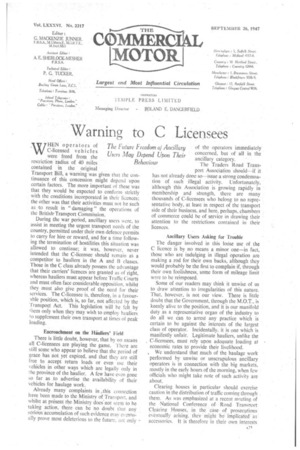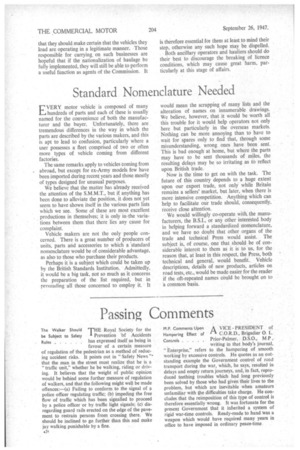Warning to C Licensees
Page 27

Page 28

If you've noticed an error in this article please click here to report it so we can fix it.
HEN operators of C-licensed vehicles were freed from the restriction 'radius. of 40 Miles containedin the original . Transport Bill, a warning was given that the continuance of this concession might depend upon certain factors. The more important of these was that they would be expected to conform strictly with the conditions incorporated in their licences; the other was that their activities must not be such as to result in " damaging" the operations of the British-Transport Commission.
During the war period, ancillary users were, to assist in meeting the urgent transport needs of the country, permitted under their own defence permits to carry for hire or reward, and for a time following the termination of hostilities this situation was allowed to continue; it was, however, never intended that the C-licensee should remain a§ a competitor to •hauliers in the A and B classes. Those in the C class already possess the advantage that their carriers' licences are granted as of right, whereas hauliers must appear before Traffic Courts and must often face considerable opposition, whilst they must also give proof of the need for their services. The C-licensee is, therefore, in a favourable position, which is, so far, not affected by the Transport Act. This legislation will be felt by them only when they may wish to employ hauliers 10 supplement their own transport at times of peak loading.
Encroachment on the Hiuliers' Field There is little doubt, however, that by no means all C-licensees are playing the game. There are still some who appear to believe that the period of grace has not yet expired, and that they are stilt free to accept return loads or even use their vehicles in other ways which are legally only in the province of the haulier. A few have even gone so far as to advertise the availability of their vehicles for haulage work.
Already many complaints in ,this connection have been made to the Ministry of Transport, and whilst at pre'sent the Ministry does!not seem to be takirig action, there can be no doubt that an serious accumulation of such evidence may e‘ ally prove most deleterious to the future. no only of the operators immediately concerned, but of all in the ancillary category. '
The Traders Road Transport Association should--if it has not already done so—issue a strong condemnation of such illegal activity. Unfortunately, although this Association is growing rapidly in membership and strength, there are many thousands of C-licensees who belong to no representative body, at. least in respect of the transport side of their business, and here, perhaps, chambers of commerce could be of service in drawing their attention to the restrictions contained in their licences.
Ancillary Users Asking for Trouble The danger involved in this locise use of the C licence is by no means a minor one—in fact, those who are indulging in illegal operation are making a rod for their own backs, although they would probably be the first to complain if, through their own foolishness, some form of mileage limit were to be reimposed.
Some of our readers may think it unwise of us to draw attention to irregularities of this nature. That, however, is not our view. There is little doubt that the Government, through the M.O.T., is keenly alive to the position, and it is our manifold duty as a representative organ of the industry to do all we can to arrest any practice which is certain to be against the interests of the largest class of operator. Incidentally, it is one which is manifestly unfair. Legitimate hauliers, unlike the C-licensees, must rely upon adequate loading at economic rates to provide their livelihood.
We understand that much of the haulage work performed by unwise or unscrupulous ancillary operators is in connection with the big Markets: mostly in the early hours of the morning, when few officials who might take note of such activity are about.
Clearing houses in particular should exercise caution in the distribution of traffic coming through . them. As was emphasized at a recent meeting of the National Conference. ofRoad Transbort, Clearing .1-louseS, in the 'Case of proseeution$. eventually arising, they might 'be: iinPlicated as accessories. It is therefore in their own interests that they should make certain that the vehicles they load are operating in a legitimate manner. Those responsible for carrying. on such businesses are hopeful that if the nationalization of haulage be fully implemented, they will still be able to perform a useful function as agents of the Commission. It is therefore essential for them at least to mind their step, otherwise any such hope may be dispelled. Both ancillary operators and hauliers should do their best to discourage the breaking of licence conditions, which may cause great harm, particularly at this stage of affairs.




















































































